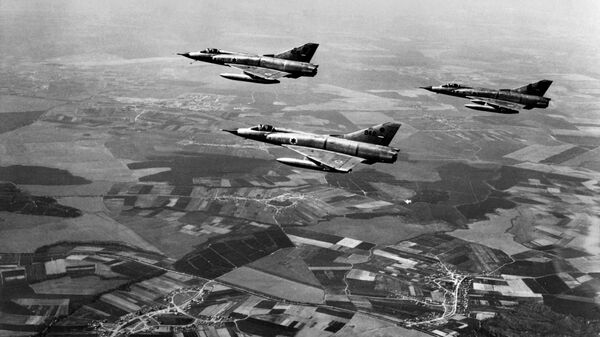It started off with a handshake, cooperation and a lot of good faith. Despite a few hiccups and bitterness over the 1967 Six-Day War, which cost Jordan the West Bank, the peace treaty between Israel and Jordan made perfect sense, primarily due to their common interests.
Long History of Bilateral Cooperation
Back in the 1920s, before the creation of the state of Israel, King Abdallah I of Jordan cooperated with the Jewish leadership against a common threat emanating from Haj Amin El Husseini, a grand mufti of Jerusalem who was leading a nationalistic movement in Palestine, something that Jordanians couldn’t accept.
After the establishment of Israel in 1948, the two countries teamed up to curb the spread of Palestinian nationalism and later on, cooperated against the threat of Egypt's Gamal Abdel Nasser, who symbolised everything that Jordan feared: anti-Western and anti-monarchy ideas.
In the 1970s, the two countries also joined forces in their battle against Black September Palestinian militants, who staged attacks on Israeli towns from Jordanian territory.
Now, however, 25 years since peace was established, the peace agreement between Israel and Jordan is showing signs of cracking.
Cracks Appeared
A year ago, amid unrest in Jordan, King Abdallah II announced that he would terminate the lease of two parcels of agricultural land, Naharaim and Tzofar, which for the past 25 years have been cultivated by Israeli farmers. Despite reports of a U-turn in Abdallah's decision, negotiations have resulted in a standoff. With no breakthrough in sight, the area is set to be handed back to Jordan on 10 November.
Efraim Halevy, Israel's former Mossad director, who played a pivotal role in the negotiations that lead to the historic peace treaty, says that the talks had hit a dead-end partially because of Israeli foreign policy being crippled by two rounds of elections in one year and the deadlock in coalition talks.
Although he believes the peace deal that was struck on 26 October 1994 is not at risk, there has been a shift in the Jordanian attitude towards Israel.
"Things have changed. The region has seen many wars and an influx of refugees, streaming to Jordan from the neighbouring Iraq and Syria, putting a burden on the already struggling Jordanian economy," he said.
But there are other reasons too. Even though Abdallah continued the line of his father, King Hussein, who signed the agreement with the late Prime Minister Itzhak Rabin, gone were the spark, the understanding and the chemistry that had existed between the two leaders.
Also gone was also a Jordanian hope for stability in the region. With the eruption of the Second Intifada, a popular uprising among Palestinians, in Israel in 2000, Jordanians started fearing that the upheaval would result in an influx of Palestinian refugees, something that would shake Jordan's economy. The aftermath of the 2003 US invasion of Iraq hadn't contributed to stability either: with Saddam Hussein gone and the void being filled by various militias and terrorist groups, Jordan had to brace itself against the raging conflicts on its borders.
In addition, the eruption of the Arab Spring in 2011, which toppled several regimes, lead the Jordanian leadership to the conclusion that they should be more attentive to public opinion. Given the fact that 70 per cent of Jordan's ten million population is of Palestinian origin and harbours little sympathy towards Israel, a peace treaty with a country considered to be an occupier of Palestinian lands has never been met with a lot of enthusiasm.
Peace Treaty With Israel a National Interest
However, Halevy remains optimistic, saying Jordan has managed to effectively contain public opinion.
"It is a strategic, a military and a national interest of Jordan to keep the treaty with Israel intact. When President Mubarak was toppled in Egypt and angry mobs stormed the Israeli embassy in Cairo, many feared that the (Israeli) peace treaty with Egypt would come to an end. But nothing has happened, simply because the national interests of Egypt prevailed. I believe it will be the same with Jordan," he said.
However, the former Mossad chief believes that Israel will need to make concessions in order to maintain good relation with the Hashemite Kingdom, primarily because a position of military and economic power gives the Jewish state more maneuvering abilities. "Israel is stronger than Jordan and as such, it will have to make necessary adjustments and concessions to make things work," he said.




